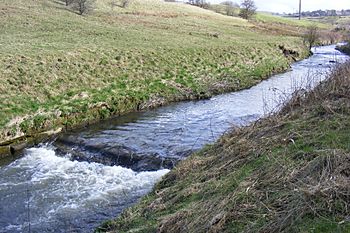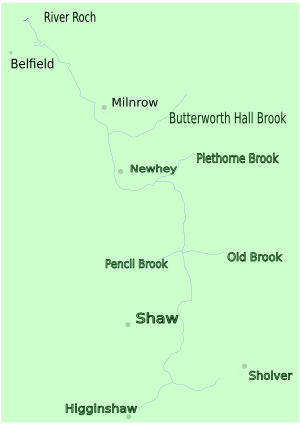River Beal facts for kids
Quick facts for kids River Beal |
|
|---|---|

River Beal at Firgrove.
|
|
 |
|
| Country | England |
| Physical characteristics | |
| Main source | Stoneleigh Park, Derker 53°33′14″N 2°5′46″W / 53.55389°N 2.09611°W |
| River mouth | River Roch, Belfield 53°37′40.41″N 2°7′55.68″W / 53.6278917°N 2.1321333°W |
|}
The River Beal is a small river located in Greater Manchester, England. It is a "tributary" of the River Roch, which means it's a smaller river that flows into a larger one. The River Beal starts in a beautiful green area called the Beal Valley. This valley is found between the towns of Sholver and Royton.
From its start, the River Beal flows north. It passes through several towns and areas, including Shaw and Crompton, Newhey, Milnrow, and Belfield. Finally, it joins the River Roch at Belfield.
Contents
The Journey of the River Beal
The River Beal begins its journey in the Beal Valley. This valley is a lovely green space located between Oldham and Shaw and Crompton. As the river flows north, it travels through the Metropolitan Borough of Oldham. Along this part of its journey, two smaller streams, Old Brook and Pencil Brook, join the River Beal, adding to its flow.
The river continues its path into the Metropolitan Borough of Rochdale. Here, it flows through the towns of Newhey and Milnrow. Eventually, the River Beal reaches Belfield, where it meets and merges with the larger River Roch. For some parts of its route, the River Beal acts as a natural border, separating areas like Oldham from Royton and Shaw and Crompton.
A Look at the River Beal's Past
The River Beal has a long history, with records going back many centuries.
Early History of the Beal Valley
In the year 1212, the Beal Valley was part of a large estate known as Kaskenmoor. This land was held by Roger de Montbegon and William de Nevill on behalf of King John. This shows that the area around the river was important even a very long time ago.
Industrial Changes Along the River
Much later, in 1892, a large factory called Ellenroad Cotton Mill was built right next to the River Beal. This mill was famous for making very fine cotton yarn using a method called "mule spinning." Rivers were often used by factories in the past because they provided water power and a way to get rid of waste.
In the past, there was a bleaching and dyeing factory near the river. This factory used to release its used dyes and waste into the River Beal. Because of this, the river's water would sometimes change color from one day to the next, depending on what colors the factory was using!
Modern Changes to the River
Around 1997, a company called Littlewoods PLC made a small change to the river's path. They did this to make space for building their large Shaw National Distribution Warehouse Centre. This shows how human development can sometimes lead to small adjustments in natural landscapes.
In 2005, there was an incident where raw sewage was accidentally released into the river. This caused a lot of fish to die and made local people worried about their health. This event highlighted the importance of keeping our rivers clean and healthy for both wildlife and people.
Streams That Join the River Beal
Many smaller streams and brooks flow into the River Beal, adding to its water. These are called "tributaries." Here are some of the streams that join the River Beal:
- Butterworth Hall Brook
- Piethorne Brook
- Jubilee Brook
- Old Brook
- Leornardin Brook
- Pencil Brook
- Besom Hill Brook
- Fullwood Brook
- Hodge Brook
| Next confluence upstream | River Roch | Next confluence downstream |
| Ash Brook | River Beal | Stanney Brook |
Images for kids
-
The River Beal is sourced from the Beal Valley, between Oldham and Shaw and Crompton
 | Isaac Myers |
 | D. Hamilton Jackson |
 | A. Philip Randolph |










